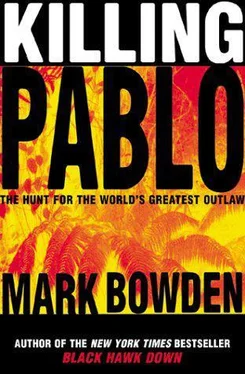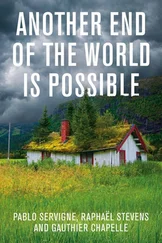Mark Bowden - Killing Pablo - The Hunt for the World's Greatest Outlaw
Здесь есть возможность читать онлайн «Mark Bowden - Killing Pablo - The Hunt for the World's Greatest Outlaw» весь текст электронной книги совершенно бесплатно (целиком полную версию без сокращений). В некоторых случаях можно слушать аудио, скачать через торрент в формате fb2 и присутствует краткое содержание. Жанр: Старинная литература, на английском языке. Описание произведения, (предисловие) а так же отзывы посетителей доступны на портале библиотеки ЛибКат.
- Название:Killing Pablo: The Hunt for the World's Greatest Outlaw
- Автор:
- Жанр:
- Год:неизвестен
- ISBN:нет данных
- Рейтинг книги:3 / 5. Голосов: 1
-
Избранное:Добавить в избранное
- Отзывы:
-
Ваша оценка:
- 60
- 1
- 2
- 3
- 4
- 5
Killing Pablo: The Hunt for the World's Greatest Outlaw: краткое содержание, описание и аннотация
Предлагаем к чтению аннотацию, описание, краткое содержание или предисловие (зависит от того, что написал сам автор книги «Killing Pablo: The Hunt for the World's Greatest Outlaw»). Если вы не нашли необходимую информацию о книге — напишите в комментариях, мы постараемся отыскать её.
Killing Pablo: The Hunt for the World's Greatest Outlaw — читать онлайн бесплатно полную книгу (весь текст) целиком
Ниже представлен текст книги, разбитый по страницам. Система сохранения места последней прочитанной страницы, позволяет с удобством читать онлайн бесплатно книгу «Killing Pablo: The Hunt for the World's Greatest Outlaw», без необходимости каждый раз заново искать на чём Вы остановились. Поставьте закладку, и сможете в любой момент перейти на страницу, на которой закончили чтение.
Интервал:
Закладка:
In November 1993, Pentagon officials sought to end U.S. involvement in the manhunt. They were concerned that American forces in Colombia were going beyond their instructions and possibly violating a presidential directive prohibiting American involvement in assassinations of foreign citizens. The campaign to withdraw the U.S. personnel was stalled by a lobbying effort led by the American ambassador in Bogota. Five weeks later, Escobar was killed by Colombian police.
Official accounts at the time said Escobar, 44, was killed Dec. 2, 1993, in a gun battle on a rooftop in the city of Medellin. Autopsy reports and photos reveal that he was shot point-blank in the ear. A senior Colombian National Police commander said Escobar was executed by a member of the Search Bloc after being wounded. The Colombian government had said its aim was to arrest Escobar, an indicted criminal.
The mission to track down Escobar rid Colombia of a violent menace who threatened to topple the state. Escobar had terrorized his country beginning in 1984 - assassinating judges, police officers, journalists and politicians. Much of the violence was meant to coerce the Colombian government to ban extradition of drug traffickers to the United States. Escobar was believed to have ordered the killings of three of the five candidates for president of Colombia in 1989.
But eliminating Escobar did nothing to stem the flow of cocaine to the United States, and may have inadvertently contributed to the formation of "super cartels" - alliances among guerrillas, growers, paramilitaries and traffickers that today threaten the government of Colombia. Those alliances are one target of the $1.3 billion in U.S. anti-narcotics aid to Colombia this year, which includes 300 American troops training Colombian security forces.
American involvement in the hunt for Escobar began in 1989, when President Bush authorized a secret military effort to help Colombia track down leaders of the Medellin cocaine cartel. Its code name was Heavy Shadow.
Centra Spike, a top-secret Army unit that specialized in tracking people by monitoring telephone and radio calls, was covertly sent to Colombia in August of that year.
The sophisticated surveillance helped chase Escobar into hiding and a life on the run. He surrendered to Colombian authorities in 1991 after negotiating a deal that allowed him to live with his closest associates in a comfortable "prison" built for him in his hometown of Envigado, near Medellin.
Escobar fled the prison on July 22, 1992, when Colombian authorities tried to move him to a real prison. After he disappeared, Colombian President Cesar Gaviria asked the United States to expand its assistance. Bush authorized the clandestine deployment of Delta Force and other U.S. personnel, and the multimillion-dollar effort continued during the Clinton administration until Escobar's death.
Public statements by U.S. officials during the manhunt acknowledged that American forces had helped train the Colombian Search Bloc. But American involvement in the effort was far more extensive than that.
Participants said that secret U.S. contributions totaled hundreds of millions of dollars in hardware, personnel and cash. At its height, with all these forces assembled under Ambassador Morris D. Busby and CIA station chief Bill Wagner, Bogota was the largest CIA station in the world.
The hunt for Escobar took an ugly turn in February 1993, when a vigilante group calling itself Los Pepes (Perseguidos por Pablo Escobar, or People Persecuted by Pablo Escobar) embarked on a campaign of murder and bombings.
The vigilantes burned Escobar's mansions and luxury cars and began methodically killing off lawyers, bankers, money-launderers, assassins and relatives who helped him maintain his cocaine empire. In so doing, the vigilantes made a key contribution - stripping away the infrastructure of Escobar's organization and leaving him isolated and afraid for his family.
In communiques, Los Pepes said it was composed of relatives of people murdered or terrorized by Escobar. The vigilantes hung a sign around the neck of one victim that read: "For working with the narco-terrorist and baby-killer Pablo Escobar. For Colombia. Los Pepes."
The Search Bloc's methods were no less brutal. So many of its targets were killed, rather than arrested, that American officials came to regard the phrase "Killed in a gun battle with the Colombian police" as a euphemism for summary execution.
Busby, then the U.S. ambassador, and Colombian Gen. Hugo Martinez, the Search Bloc commander, both deny that the hunt for Escobar was tainted by cooperation with Los Pepes, who at their busiest were killing as many as five people a day. The group assassinated an estimated 300 people. No one was ever prosecuted for these murders.
Martinez said in interviews that he and his men had no association with Los Pepes, whom he called a "nuisance."
"They made more trouble for us than help," said Martinez, who survived numerous attempts on his life and on his family. He said he turned down a $6 million bribe from Escobar to abandon the chase.
Busby said he had been told of evidence that the Search Bloc and Los Pepes were working together, but never found it convincing. He said that if he had believed the two groups were linked, "it would have been a show-stopper. We would have pulled everybody out of the country. I communicated that directly to the Colombian president."
The evidence Busby had seen was detailed in a secret cable he wrote on Aug. 1, 1993. In it, the ambassador said that Colombia's top prosecutor had told him he had "very good" evidence of a connection. Busby also said that "our own reporting" suggested a link.
Separate DEA cables from the embassy noted the connection between the Search Bloc and a leader of Los Pepes.
Busby, in an interview, said he had not seen the DEA cables and that DEA agents and Delta Force operatives never informed him of the interactions they witnessed between members of the Search Bloc and Los Pepes.
He said he still does not believe the Search Bloc and the vigilantes were connected.
In a series of interviews, former Colombian President Gaviria, now general secretary of the Organization of American States, said he suspected ties between his police generals and Los Pepes.
"I was very concerned there was a connection," Gaviria said. "I spoke out against Los Pepes very strongly from the beginning, but I feared there was a connection with the police. I think the police felt they were very close to getting Escobar, and maybe they went ahead because of that."
Colombian Fiscal General Gustavo de Greiff, the equivalent of the U.S. attorney general, had more than suspicions. During the summer of 1993, he told U.S. officials in Bogota that he had strong evidence that Martinez and several top officers of the Search Bloc were working with Los Pepes. He said the evidence was sufficient to charge them with bribery, drug trafficking, torture, kidnapping and possibly murder.
Busby relayed this information to Washington in his secret cable of Aug. 1, 1993. The ambassador expressed misgivings about the sources of de Greiff's information. Many of the allegations, he wrote, were made by "ex-Escobar assassins" trying to discredit the Search Bloc.
Nevertheless, Busby said, he had urged de Greiff and the Colombian defense minister to immediately remove Martinez and the other officers, and had threatened to withdraw American support if they failed to do so. Busby said he wanted to "remove the taint from the anti-Escobar effort."
Contrary advice was being offered by Joe Toft, the DEA chief in Bogota. In a cable written two days after Busby's, Toft said he had urged Colombian officials to keep Martinez in place. The message reads in part: "The BCO" - Bogota Country Office, meaning the U.S. Embassy - "continues to support Colonel Martinez and his subordinates."
Читать дальшеИнтервал:
Закладка:
Похожие книги на «Killing Pablo: The Hunt for the World's Greatest Outlaw»
Представляем Вашему вниманию похожие книги на «Killing Pablo: The Hunt for the World's Greatest Outlaw» списком для выбора. Мы отобрали схожую по названию и смыслу литературу в надежде предоставить читателям больше вариантов отыскать новые, интересные, ещё непрочитанные произведения.
Обсуждение, отзывы о книге «Killing Pablo: The Hunt for the World's Greatest Outlaw» и просто собственные мнения читателей. Оставьте ваши комментарии, напишите, что Вы думаете о произведении, его смысле или главных героях. Укажите что конкретно понравилось, а что нет, и почему Вы так считаете.












